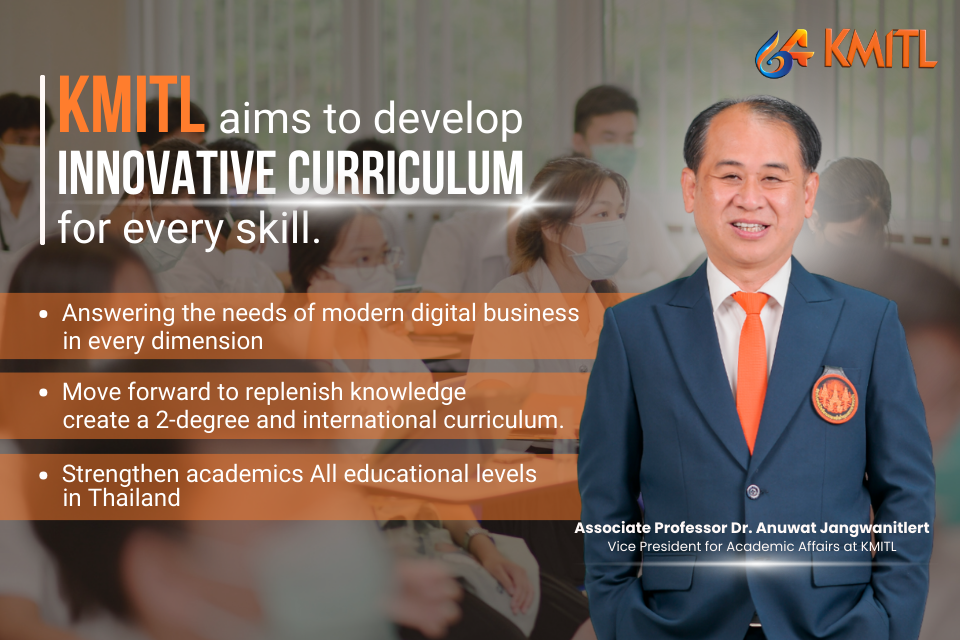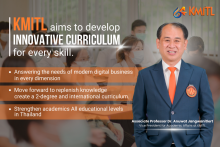KMITL aims to develop innovative curriculum for every skill.
Answering the needs of modern digital business in every dimension
KMITL is dedicated to crafting innovative curricula that address the demands of contemporary digital business across all facets. In the era of digital advancement, "innovation" not only transforms the business landscape but also stands as a crucial catalyst for sustainable industrial and societal development. Educational institutions play a pivotal role in this paradigm shift, serving not merely as knowledge repositories but as essential components in nurturing a new generation of innovators. They lay the groundwork for innovation, ensuring adaptability to the ever-evolving needs of business and society.
For almost six decades, King Mongkut's Institute of Technology Ladkrabang (KMITL) has steadfastly pursued the development of diverse teaching curricula to remain abreast of current trends. This endeavor aims to produce individuals contributing to national progress through scientific and technological research, creativity, and global innovation. According to Associate Professor Dr. Anuwat Jangwanitlert, Vice President for Academic Affairs at KMITL, the institution's academic and curricular management focuses on cultivating students equipped with knowledge and skills in innovation to meet future societal and occupational requirements. To achieve this goal, collaboration with various stakeholders is essential, involving the enhancement of existing curricula and the creation of new courses with international recognition.
In this context, Associate Professor Dr. Anuwat underscores the importance of shaping students to meet the dynamic demands of today's labor market and society. The key lies in curriculum development, extending beyond the expertise of the teaching staff alone. Dr. Anuwat advocates a collaborative approach, involving partnerships with entrepreneurs and individuals possessing widely recognized external qualifications. This collaborative effort aims to facilitate the exchange of ideas, research, and the critical analysis of curriculum suitability. Practical sessions are incorporated to provide students with hands-on experience in authentic work settings alongside entrepreneurs from the outset of their academic journey.
Recognizing the imperative of early exposure to the professional world, the curriculum implementation begins in the first year. This proactive approach ensures that students gain a comprehensive understanding of the work environment. Waiting until the final stages of their studies for internships is deemed potentially tardy in the contemporary landscape. The outcomes of this collaborative curriculum development model are evident in KMITL graduates, who possess both knowledge and practical skills. Consequently, they become highly sought after in sectors that value innovation. As graduation nears, there is a notable surge in employment reservations.
KMITL's curriculum is distinct in its departure from traditional theories, continuously adapting to real-world dynamics. It provides students with opportunities to immerse themselves in authentic work environments, encouraging the application of knowledge and research to address real-world challenges. The emphasis on practical experience ensures that upon graduation, students are fully equipped and prepared for the workforce. The innovative curriculum, rooted in actual research outcomes rather than theoretical concepts, not only garners satisfaction from entrepreneurs but also lays the groundwork for future employment opportunities.
Move forward to replenish knowledge Create a 2-degree and international curriculum.
Moving forward to enrich knowledge, KMITL has embarked on the creation of 2-degree and international curricula. Associate Professor Dr. Anuwat disclosed that KMITL's progress extends beyond collaboration solely with the business sector, as it has forged alliances with educational agencies and other leading Thai universities, as well as universities abroad. This collaborative effort encompasses the development of both long-term and short-term training principles. Today, KMITL stands as one of the higher education institutions with a significantly expanded curriculum, featuring numerous double degree and international programs.
The Vice President for Academic Affairs at KMITL expounded on the concept of the 2-degree program, encompassing a comprehensive curriculum both within Thailand and abroad. Unlike conventional single courses, KMITL's approach results from collaboration with entrepreneurs and various social sectors, coupled with a keen focus on student needs. Recognizing the evolving preferences of the new generation for modern learning concepts, the institute identified a desire for diversified knowledge beyond traditional boundaries. Responding to this, KMITL designed a 2-degree program to merge two areas of expertise, featuring a cohesive core connecting the knowledge domains.
Dr. Anuwat acknowledged the complexity of this endeavor, requiring the design of a balanced curriculum from scratch. He emphasized that the goal is not to compress the study framework excessively but to create a harmonious blend of content. Despite the challenges, the potential benefits for students are substantial, enabling them to graduate with broader skills applicable to a variety of jobs. This innovative approach allows students to understand diverse aspects, such as structural calculations in civil engineering and creative design principles in architecture, enriching each other's knowledge.
Currently, KMITL has implemented 2-degree programs, serving as a pilot for collaboration between faculties. Typically, the development of a 2-degree program takes 6 months to 1 year, but KMITL's efficiency stems from continuous curriculum development and strong cooperation with educational institutions in Thailand and abroad. Dr. Anuwat emphasized that while creating a curriculum requires careful consideration, the alignment of core components is crucial for the program's success. The 2-degree programs at KMITL range from collaborations within the institution, like the Intelligent Agricultural Engineering program, to partnerships with external institutions, such as the joint program with the National Institute of Development Administration (NIDA).
Moreover, KMITL has extended its collaborations internationally, offering courses like international logistics management in collaboration with Inha University, South Korea. The institute's emphasis on practical collaborations is exemplified by the interest from airlines, including Japan Airlines, in accepting KMITL students for internships due to the logistics management course developed in conjunction with the International Aviation Industry College.
Looking ahead, the prospect of KMITL adjusting to teaching as a 2-degree program is seen as viable, given the diverse needs of Thai students. The contemporary landscape demands multi-skilled individuals, not just in terms of business knowledge but also in science to foster innovation. Dr. Anuwat highlighted the importance of providing students with a skill set that allows them to pursue entrepreneurship or scientific development.
In addition to the 2-degree program, KMITL has placed significant emphasis on the development of international curricula. With over 20 programs in place, ranging from dentistry to information technology, culinary science, and engineering, these international curricula not only provide students with global knowledge but also contribute to social development by fostering an international student exchange environment.
Associate Professor Dr. Anuwat believes that the international curriculum isn't merely about gaining knowledge for working abroad but also about social development through the exchange of students globally, creating a dynamic learning environment. Whether Thai students studying abroad in Europe or Japan or foreign students coming to KMITL, this internationalization contributes to a richer educational experience for all involved.
Strengthen academics All educational levels in Thailand
Dedicated to fortifying academic standards across all educational levels in Thailand, KMITL has not only garnered recognition within the national education sphere as a pioneering institution in innovation but has also earned international acclaim. This recognition has translated into collaborative efforts to establish specialized educational institutions aimed at producing graduates who can expertly support industry needs and contribute to the evolving global landscape, spanning all educational tiers. This holistic approach seeks to empower Thai students with the knowledge and skills to drive societal and national development at every stage of their educational journey.
Recently, KMITL has fostered collaborations both domestically and abroad, resulting in the establishment of four educational institutions: CMKL University, 42 Bangkok, King Mongkut's International Demonstration School, and the KOSEN Institute of King Mongkut's Institute of Technology Ladkrabang (KOSEN - KMITL).
CMKL University, a collaboration between KMITL and Carnegie Mellon University in the United States, stands as a beacon of AI knowledge open to students from bachelor's degree to doctoral levels. Functioning as a hub for research and innovation, CMKL aligns its teaching principles with the esteemed standards set by Carnegie Mellon University. Currently operating within KMITL's Lifelong Learning Center, CMKL not only produces skilled technology personnel for the market but also enhances KMITL's research potential, fostering efficient research and development in the digital industry for Thailand's benefit.
The collaboration with Ecole 42 Paris, France, has given rise to 42 Bangkok, a world-class programming institute. Recognizing the pivotal role of coding in the digital era, KMITL established 42 Bangkok to cultivate coding expertise in Thailand. Open to individuals aged 18 and above who possess skills in the field, this program employs a coaching format, emphasizing group study and mutual guidance. Successful completion of the 4-year program awards students a degree certificate from Ecole 42 Paris. The program's success is evidenced by the swift integration of many students into various digital companies, meeting the pressing demands of the business society.
King Mongkut's International Demonstration School, the first international school with a focus on science studies, offers AP courses based on the American curriculum. Emphasizing science, mathematics, and technology (STEM), the school encourages a learning environment where students explore new concepts continuously. Unique to this institution is the opportunity for students to utilize KMITL's facilities, and they may even choose a "Pathway to KMITL" track for entry into bachelor's degree programs at KMITL.
Expanding beyond digital knowledge and technology development in both basic and higher education, KMITL extends support to vocational education and associate's degree programs. The Kosen Institute of KMITL, established in cooperation with the Japanese government, focuses on engineering, technology, and innovation. Offered through the Faculty of Engineering at KMITL, the institute currently provides programs in Mechatronics Engineering, Computer Engineering, and Electrical and Electronics Engineering, with plans to open a production engineering major in 2024 to meet market demands. These courses emphasize practical work to equip students with foundational knowledge and skills that align with market needs.
Associate Professor Dr. Anuwat, a stalwart in the education industry, stresses the pivotal role of the teaching curriculum in shaping quality personnel for societal contribution. Recognizing the potential for a well-educated workforce to propel the country forward economically and socially, KMITL remains steadfast in its commitment to education and research. Driven by the mission to produce individuals with expertise in science and technology, KMITL continuously evolves its curriculum to meet societal needs. Focusing on teaching methods that foster critical thinking, analysis, and research application, KMITL aims to empower students to become a driving force in the country's development within the digital age.

